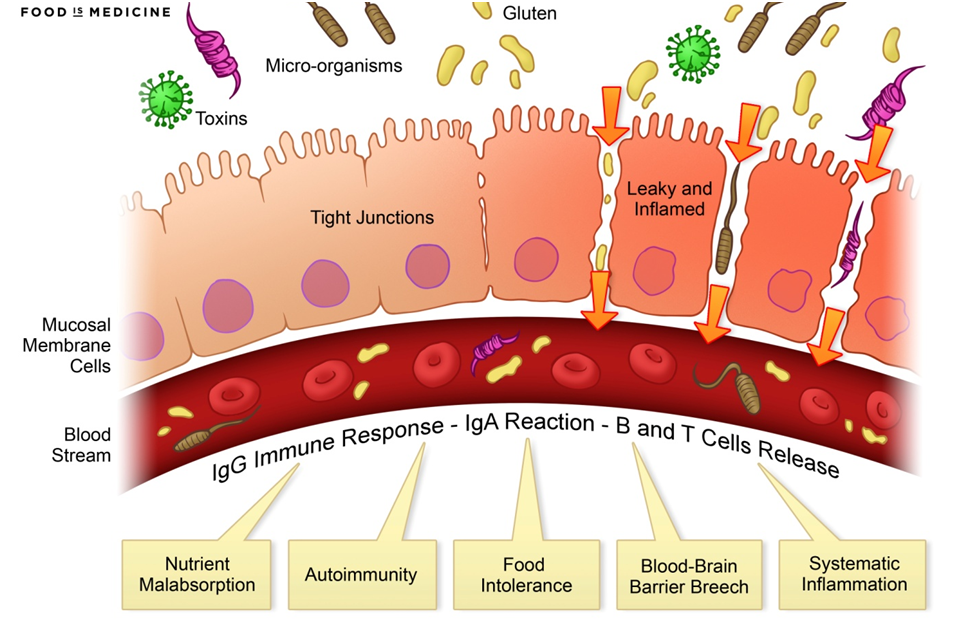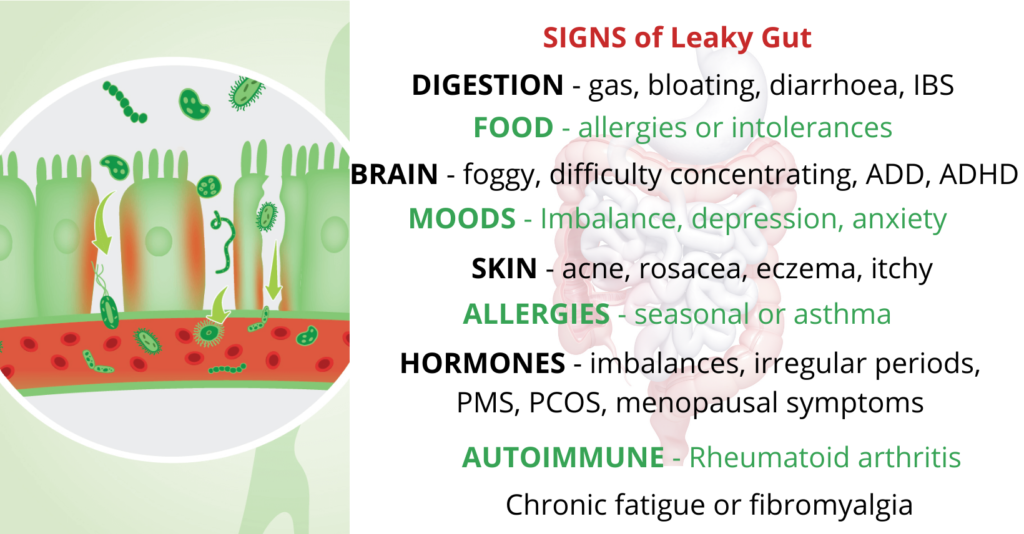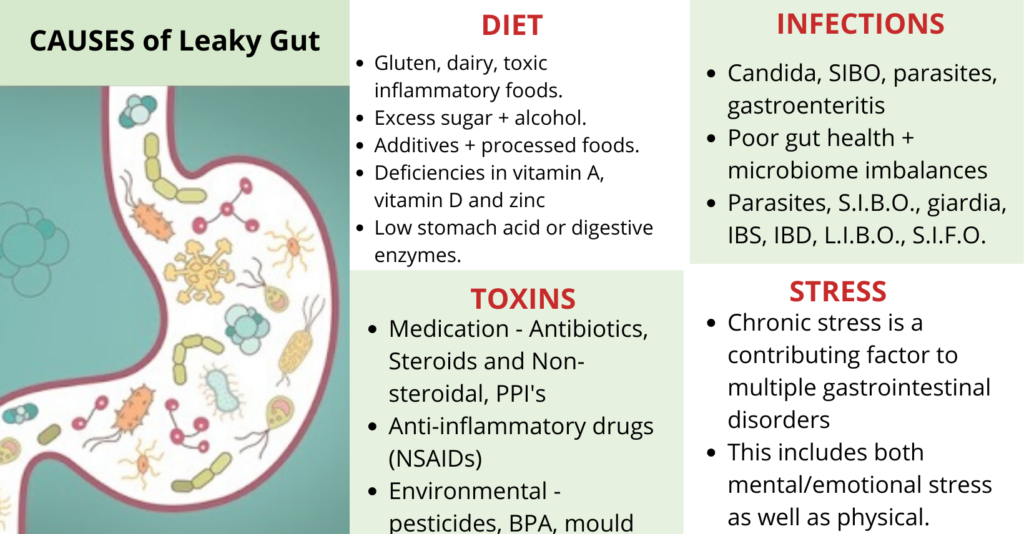Leaky Gut Syndrome

What Is Leaky Gut Syndrome?
Leaky gut, also known as increased intestinal permeability, is a digestive condition in which bacteria and toxins are able to “leak” through the intestinal wall.
Is Leaky Gut a cause or a symptom of disease?
There is quite a bit of scientific evidence that leaky gut does exist and may be associated with multiple health problems.
What Is “Leaky Gut” exactly?
The human digestive tract is where food is broken down and nutrients are absorbed.
The digestive system also plays an important role in protecting your body from harmful substances. The walls of the intestines act as a barrier, controlling what enters the bloodstream to be transported to your organs.
Small gaps in the intestinal wall which are called “tight junctions” allow water and nutrients to pass through, while blocking the passage of harmful substances. Leaky Gut Syndrome is the deterioration or breakdown of the intestinal wall, in particular, these tight junctions that hold the intestinal cells together. Intestinal permeability refers to how easily substances pass through the intestinal wall.
When the tight junctions of intestinal walls become loose, the gut becomes more permeable, which may allow bacteria and toxins to pass from the gut into the bloodstream. This phenomenon is commonly referred to as “leaky gut,” where microscopic holes appear in the abdominal wall.
When the gut is “leaky” and bacteria and toxins enter the bloodstream, it can cause widespread inflammation and trigger a reaction from the immune system.
Under normal circumstances the lining of your intestines is nearly leak proof, and only fully digested food molecules are permitted to pass through the lining into your bloodstream and lymph vessels.
This is very fortunate for within the world of your stomach and intestines, the environment is very hostile and loaded with powerful acids, digestive enzymes, undigested food materials and trillions of micro-organisms.
Unfortunately this leak proof lining is only one cell layer thick and can be easily damaged.

How Does Leaky Gut Syndrome Cause Health
Problems?
Leaky Gut Syndrome can occur in either the large or small intestines or both. These microscopic holes allow intestinal bacteria, parasites, worms, their bi-products, food allergens, undigested food, poisons and toxins to pass directly into the bloodstream via the portal vein. Once in the blood, these particles interact with immune complexes and trigger inflammatory responses. The portal vein feeds directly to the liver, which is the main detoxifying organ that removes these particles and toxins from the blood. Once the liver detoxifies these substances, it dumps them back into the intestines for removal in the faeces.
Leaky Gut Syndrome creates intestinal inflammation, which creates Dysbiosis – an imbalance between the beneficial and harmful intestinal bacteria.
There is also a reduced ability to breakdown and absorb nutrients from food resulting in a degree of malabsorption.
What are the Symptoms of Leaky Gut?
Supposed symptoms of leaky gut syndrome include bloating, food sensitivities, fatigue, digestive issues and skin problems.

As well as diseases, there are several signs and symptoms you may suffer from that indicate Leaky Gut Syndrome such as:
Fatigue Sleep Disturbances Mood Swings
Memory Difficulties Irritability Lower back pain
Muscle or joint pain Environmental sensitivity
SUMMARY: Leaky gut, or intestinal hyper-permeability, is a phenomenon that occurs when the tight junctions of the intestinal wall become loose, allowing harmful substances to enter the bloodstream.
What Causes Leaky Gut?
Leaky gut syndrome remains a bit of a medical mystery, and medical professionals are still trying to determine exactly what causes it.
A protein called zonulin is the only known regulator of intestinal permeability.
When it’s activated in genetically susceptible people, it can lead to leaky gut. Two factors that trigger the release of zonulin are bacteria in the intestines and gluten, which is a protein found in wheat and other grains.
There are likely multiple contributing factors to leaky gut syndrome.
Below are a few factors that are believed to play a role:

Chronic inflammation throughout the body can contribute to leaky gut syndrome and vice versa.
As well as: Major surgery, trauma, critical illness or serious burns.
There is more information about S.I.B.O. here.
SUMMARY: Medical professionals are still trying to determine what causes leaky gut syndrome. An unhealthy diet, long-term NSAID use, stress and chronic inflammation are some factors that are believed to contribute to it.
Diseases Associated With Leaky Gut
Many studies have connected increased intestinal permeability with multiple chronic diseases.
Coeliac Diabetes Type 1 Crohn’s disease
IBS Food allergies and sensitivities
Type 1 diabetes is caused by an autoimmune destruction of insulin-producing beta cells in the pancreas. It has been suggested that the immune reaction responsible for beta cell destruction may be triggered by foreign substances “leaking” through the gut. Patients with type 1 diabetes have been found to have significantly elevated zonulin levels. Zonulin is a known moderator of intestinal permeability.
SUMMARY: Multiple studies have demonstrated that increased intestinal permeability is indeed present in people with certain chronic diseases.
Is there a test for leaky gut?
Yes, the lactulose and mannitol test commonly known as the intestinal permeability (I.P.) test is the most common test used to correctly
diagnose Leaky Gut Syndrome. It is a simple do at home urine test, which
involves drinking a sugary solution of lactulose and mannitol and then
collecting urine over a 6 hour period and then sending a sample of to the
laboratory. The sugars should not be absorbed into the blood stream and if they are present in the urine then Leaky Gut Syndrome is present.
How to Improve Your Gut Health

I go into more detail about this on previous blog …….here……..
Summary:
Leaky gut, or increased intestinal permeability, is a condition in which bacteria and toxins are able to pass through the intestinal wall into the bloodstream.
Leaky gut syndrome is present in several autoimmune disorders.
To decrease your risk of leaky gut syndrome, focus on improving your gut health by eating a healthy diet and limiting your use of harmful medication




Pingback: Bone Broth is it healthy or hypeBone Broth - Is it all hype? | Sally Pattison
Pingback: Collagen or Bone Broth? | Sally Pattison